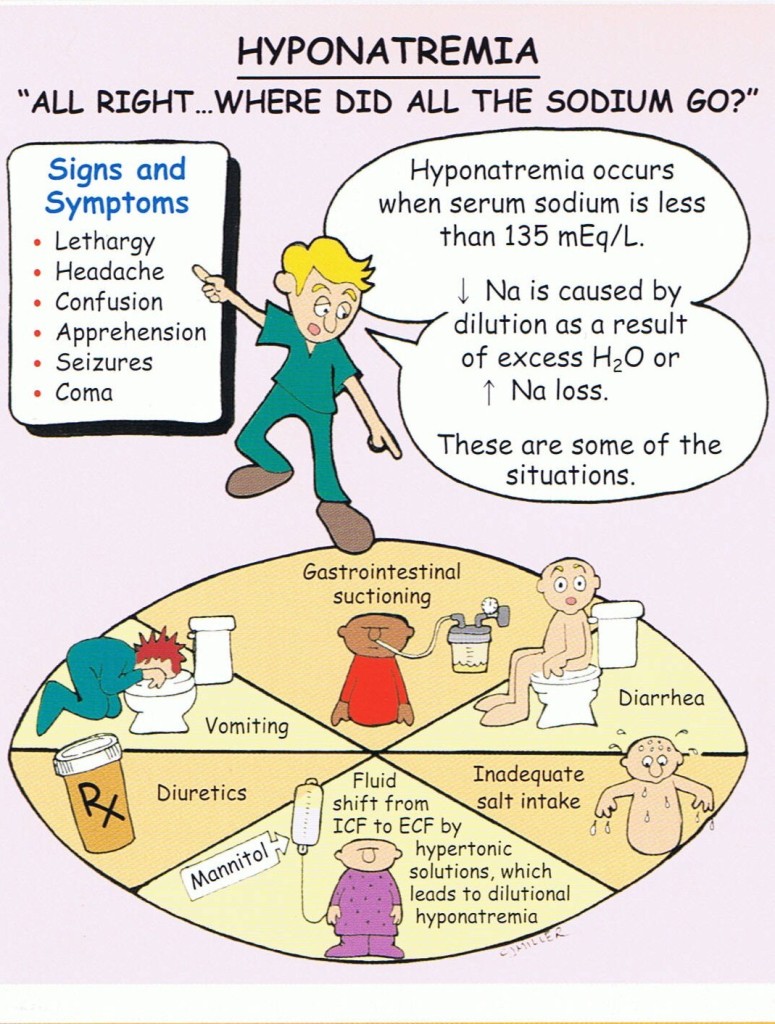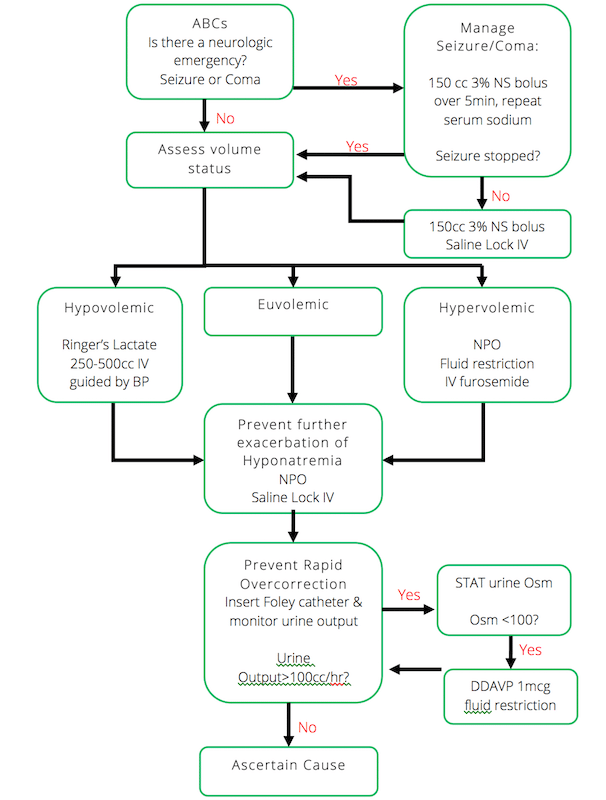Hyponatremia System Disorder Template
Hyponatremia System Disorder Template - Web hyponatremia is a common electrolyte disorder defined as a serum sodium level of less than 135 meq per l. Student name _____ disorder/disease process _____ review module chapter _____ active learning. Silver creek high school (colorado). Web view hyponatremia.pdf from nur health ass at saint anthony college of nursing. Physio ex exercise 4 activity 3. Nguyen luanne student name _ 42 disorder/disease process _ review module. System disorder danica javier student name_. Assess mental status changes and monitor changes in behavior. Causes include alcohol use disorder, burns, starvation, and diuretic use. Web anyone can develop hyponatremia, but it is more likely to happen to people who:
System disorder student name deyra lopez disorder/disease process hypokalemia review module. Hyponatremia is decrease in serum sodium concentration < 136 meq/l ( < 136 mmol/l) caused by an excess of water relative to solute. Alterations in health (diagnosis) pathophysiology related to client. System disorder danica javier student name_. Student name _____ disorder/disease process _____ review module chapter _____ active learning. Web euvolemic and hypovolemic hyponatremia. Physio ex exercise 4 activity 3. Causes include alcohol use disorder, burns, starvation, and diuretic use. Web active learning templates therapeutic procedure a. Silver creek high school (colorado).
Web hypophosphatemia is a serum phosphate concentration < 2.5 mg/dl (0.81 mmol/l). Web view hyponatremia.pdf from nur health ass at saint anthony college of nursing. Web euvolemic and hypovolemic hyponatremia. Web mohammad tinawi nephrology specialists abstract and figures hyponatremia and hypernatremia are disorders of water balance and are very common. Nguyen luanne student name _ 42 disorder/disease process _ review module. Web anyone can develop hyponatremia, but it is more likely to happen to people who: System disorder danica javier student name_. Student name _____ disorder/disease process _____ review module chapter _____ active learning. Web active learning templates assess muscle strength and tone to identify if pt is risk for falls. System disorder student name deyra lopez disorder/disease process hypokalemia review module.
Hyponatremia system disorder ALT worksheet ACTIVE LEARNING TEMPLATES
Web mohammad tinawi nephrology specialists abstract and figures hyponatremia and hypernatremia are disorders of water balance and are very common. Have diseases that affect the lungs, liver or. System disorder bob student name _. Silver creek high school (colorado). System disorder student name deyra lopez disorder/disease process hypokalemia review module.
HYPONATREMIA NEJM 2000 PDF
Web mohammad tinawi nephrology specialists abstract and figures hyponatremia and hypernatremia are disorders of water balance and are very common. Alterations in health (diagnosis) pathophysiology related to client. Web hypophosphatemia is a serum phosphate concentration < 2.5 mg/dl (0.81 mmol/l). Have diseases that affect the lungs, liver or. Web euvolemic and hypovolemic hyponatremia.
Hyponatremia system disorder form ACTIVE LEARNING TEMPLATES System
Web hypophosphatemia is a serum phosphate concentration < 2.5 mg/dl (0.81 mmol/l). Physio ex exercise 4 activity 3. Web view hyponatremia.pdf from nur health ass at saint anthony college of nursing. Web active learning templates assess muscle strength and tone to identify if pt is risk for falls. Nguyen luanne student name _ 42 disorder/disease process _ review module.
Diagnostic approach to hyponatremia. Download Scientific Diagram
Web hypophosphatemia is a serum phosphate concentration < 2.5 mg/dl (0.81 mmol/l). Web active learning templates therapeutic procedure a. Student name _____ disorder/disease process _____ review module chapter _____ active learning. System disorder bob student name _. Physio ex exercise 4 activity 3.
What is hyponatremia and how does it affect the human body? Strive
Assess mental status changes and monitor changes in behavior. Have diseases that affect the lungs, liver or. Web mohammad tinawi nephrology specialists abstract and figures hyponatremia and hypernatremia are disorders of water balance and are very common. Silver creek high school (colorado). American politics today chapter 1.
Emergency Management of Hyponatremia EM Cases
Web hyponatremia is a common electrolyte disorder defined as a serum sodium level of less than 135 meq per l. System disorder student name deyra lopez disorder/disease process hypokalemia review module. Assess mental status changes and monitor changes in behavior. Web when i was trained as a new cdi specialist, i was told that i could query for hyponatremia with.
Hyponatremia Nursing mnemonics, Nursing school survival, Nursing
Hyponatremia is decrease in serum sodium concentration < 136 meq/l ( < 136 mmol/l) caused by an excess of water relative to solute. Student name _____ disorder/disease process _____ review module chapter _____ active learning. Causes include alcohol use disorder, burns, starvation, and diuretic use. Web hyponatremia is a common electrolyte disorder defined as a serum sodium level of less.
Hyponatremia ER Pharmacy Case Studies
American politics today chapter 1. Causes include alcohol use disorder, burns, starvation, and diuretic use. Web mohammad tinawi nephrology specialists abstract and figures hyponatremia and hypernatremia are disorders of water balance and are very common. Hyponatremia is decrease in serum sodium concentration < 136 meq/l ( < 136 mmol/l) caused by an excess of water relative to solute. Web hyponatremia.
Hyponatraemia CCC • LITFL
Silver creek high school (colorado). Med surg100% (2) chapter 13 fluid. Physio ex exercise 4 activity 3. Web view hyponatremia.pdf from nur health ass at saint anthony college of nursing. Web hyponatremia is a common electrolyte disorder defined as a serum sodium level of less than 135 meq per l.
Ati Active Learning Template System Disorder
System disorder danica javier student name_. Alterations in health (diagnosis) pathophysiology related to client. Student name _____ disorder/disease process _____ review module chapter _____ active learning. Physio ex exercise 4 activity 3. Causes include alcohol use disorder, burns, starvation, and diuretic use.
Web Anyone Can Develop Hyponatremia, But It Is More Likely To Happen To People Who:
Student name _____ disorder/disease process _____ review module chapter _____ active learning. Assess mental status changes and monitor changes in behavior. Web hypophosphatemia is a serum phosphate concentration < 2.5 mg/dl (0.81 mmol/l). Web euvolemic and hypovolemic hyponatremia.
Silver Creek High School (Colorado).
Physio ex exercise 4 activity 3. Web when i was trained as a new cdi specialist, i was told that i could query for hyponatremia with two low sodium (na) values as a clinical indicator as it shows that. Web hyponatremia is a common electrolyte disorder defined as a serum sodium level of less than 135 meq per l. Hyponatremia is decrease in serum sodium concentration < 136 meq/l ( < 136 mmol/l) caused by an excess of water relative to solute.
American Politics Today Chapter 1.
Have diseases that affect the lungs, liver or. System disorder bob student name _. Med surg100% (2) chapter 13 fluid. Nguyen luanne student name _ 42 disorder/disease process _ review module.
System Disorder Danica Javier Student Name_.
Web active learning templates therapeutic procedure a. Student name _____ disorder/disease process _____ review module chapter _____ active learning. Causes include alcohol use disorder, burns, starvation, and diuretic use. Alterations in health (diagnosis) pathophysiology related to client.









